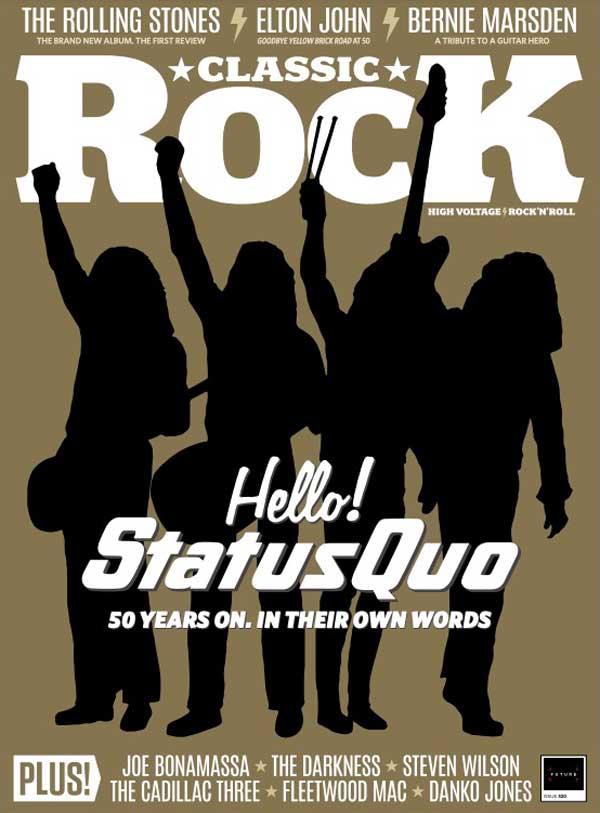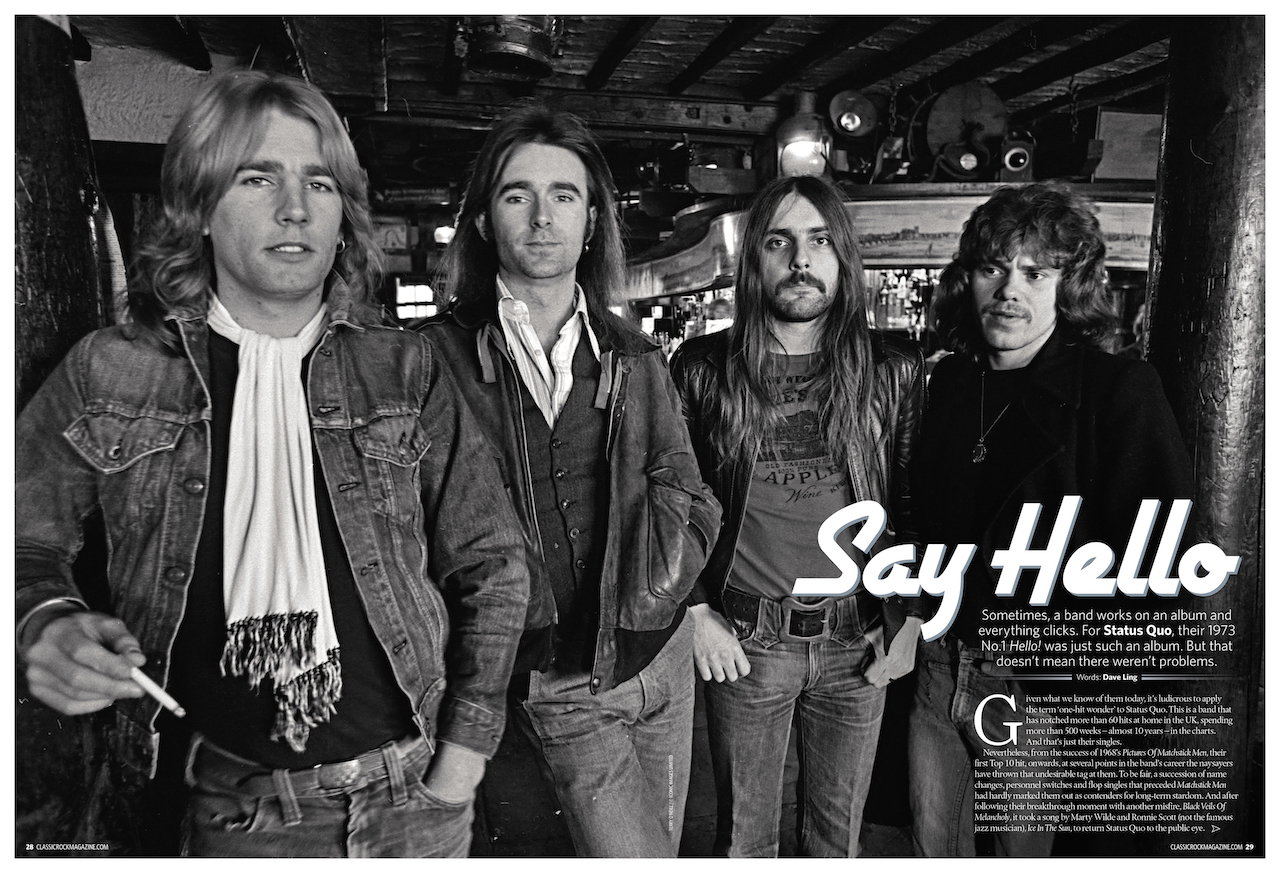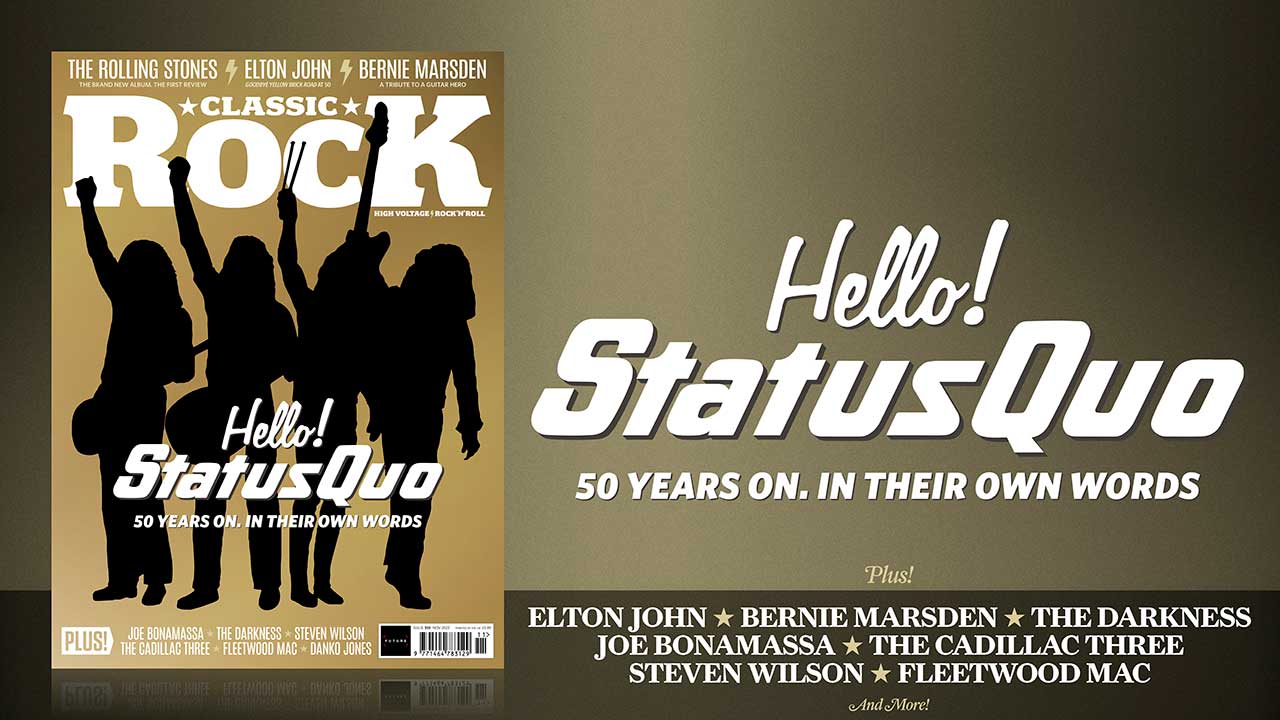
The brand new issue of Classic Rock magazine is a celebration of British boogie rock legends Status Quo’s iconic 1973 album Hello!, the record that turned them into one of the era’s biggest bands. Hello! also featured the very first contributions from keyboard player Andy Bown – a man who would go on to join Quo as a full time member a few years later, playing on many of the band’s biggest hits and remaining a key part of their line-up to this day.
But while Bob Young, the band’s chief collaborator and unofficial fifth member, considers Bown to be “the glue that held Status Quo together during some difficult times”, to some fans, his keyboards helped bring the classic ‘Frantic Four’ era to an end.
Here the man himself looks back the highs, lows and internal politics of 50 years with Quo – and what he feels about being the man who ‘ruined’ Status Quo for some.

It’s hard to believe that Hello! turns 50 this year.
“I had a blank about my first contribution so I looked it up and I now realise, thanks to you, I haven’t been with Quo for 46 years, it’s 50 years. Fifty fucking years! There’s much worse things I could have done with my time, but…”
What was the vibe like at the studio, IBC, where Quo recorded Hello!? After the success of Piledriver this was a band on the verge of becoming massive.
I guess they were but I didn’t know too much about them. Francis [Rossi, singer/guitarist] used to sit at the desk with his ears wrapped round the speakers. He was obviously more interested in the production than anyone else.
Having self-produced Piledriver and been trusted to do so again with Hello!, Quo was a very self-contained entity.
That’s right though of course they did have a lot of respect for Damon Lyon-Shaw [engineer]. I believe Damon went deaf due to recording Quo.
Tell us about their characters back then, starting with Rick Parfitt?
Richard was always very jolly. They were really thrilled to be doing well. At IBC, though this would have been later on, I remember him taking me into a separate room to play me his new song Rain at deafening volume. I was really impressed, but he said [in dismissive tones]: ‘Yeah, it brings the old ’ackers in, doesn’t it’. And of course it was a Top Ten hit. I realised later that they had quite a lot of respect for me, but at the time I felt lucky to get the job because I was starving.
What was Francis like back then?
Very pleasant, they were all very pleasant. Spud [drummer John Coghlan] was usually very quiet, but they were very pleasant chaps. As I say, we had rubbed shoulders at gigs and in the office, so I knew them quite well.
Road manager Bob Young was the unofficial fifth member.
Bob did a lot for the band, a lot that he wasn’t fully remunerated for. He was a great facilitator who worked hard for Quo. It must have been Bob that called me for the gig [of playing on Hello!]. That kind of rings a bell now.
Quo have admitted many times that they were a cocky bunch.
Yeah, I suppose so. Many years later when I had joined the band I remember being in a mini-van travelling to one of my first shows and everybody was laughing at the other drivers: ‘Look at him, he’s holding the wheel funny, right up to his chin’ and: ‘What an idiot that bloke is’. They thought it was hilarious.
They had a very weird sense of humour.
No. Not weird. It was a very juvenile sense of humour. They were like big kids in adults’ bodies.
Did you get sucked into it all?
Oh, I was totally sucked in. My sense of humour now is completely pathetic.
How did you come to actually join the band?
At first I preferred being a hired gun. Quite early on, Bob told me: ‘You really should do this’ but I didn’t want to. I had my own thing going and I didn’t want to do Quo forever. And look at me now. But I did the right thing by joining them.
How did their offer come?
There wasn’t really an offer. It just morphed, tied into the changing over of personnel. ‘You’ve got this share, and [if you join] you get a bigger share’. There was never a conversation around: ‘Are you in or are you out?’
It’s peculiar that nobody said: ‘Welcome to the club’.
Well, it was very difficult. Francis really, really wanted me in because he thought I added something. He comes from more of a Jeff Lynne mindset, sound-wise. Alan [Lancaster, bassist] didn’t, he just didn’t. He didn’t really want anyone else in the band. So there was a lot of trouble there. But he [Rossi] is Italian; he doesn’t really take ‘no’ for an answer and in the end he got his way.
Though you were not ‘officially’ a band member until 1981, the increased role of keys from Rocking All Over The World in 1977 onwards changed the course of the band.
That was a seminal moment. It was the first album I was involved in from the start because it wasn’t happening, apparently. Pip [Williams, producer] told me that. I got a call asking: ‘Can you come to Sweden now? This afternoon?’ Pip asked whether I had an intro for the title track, and the rest as they say, is history.
Things changed very quickly. We had played the Glasgow Apollo [in 1976, recorded for the following year’s double-set Live]. Five thousand blokes, all in denim – at that point you didn’t see any women. The balcony nearly fell down due to the jumping.
Because of that sea change, to a very particular type of fan, you are the guy that ruined Status Quo.
[Sounding perplexed]: I’m sorry, I am what? They’ve been going for 46 years since I joined. Where do you think they’ve been playing, in pubs? Fuck off!
But would it bother you if somebody held that opinion?
Certain people might think that – the type of person that wears only denim, has quite a lot of tattoos and doesn’t wash. We tended to lose some of them, but in their place we got 25 times more people, a much wider audience. I don’t care. One of the great things about getting old is that you care less and less about the thoughts of others.
Along with current Quo bassist Rhino Edwards, you went to Hammersmith to see the first reunion from the Frantic Four. Did it feel strange?
Not really. Francis thought it was shit. Rick was the one that held it all together because Spud [Coghlan] wasn’t doing very well and Nuff [Lancaster] could scarcely play at all.
What’s your perspective on Quo continuing without Rick Parfitt?
You know, the reality is very different to the public perception. The truth is that we carried Rick for a year. He was on quite a lot of medication and wasn’t in a good place.
You don’t want us to print that, surely?
Oh, I thought you wanted the truth. Silly me.
But, overall, it feels good to continue?
It’s been difficult, no doubt about that. There’s been a lot of damage limitation. The original sound of the band was 51 percent Rick Parfitt’s guitar and the way he played. Now Richard Malone has come in and is playing better than the Rick of his latter days. People come to see us determined not to like us, and we change their minds. That’s very satisfying.
Read the full story of Status Quo’s Hello! album in the brand new issue of Classic Rock. Order it online and have it delivered straight to your door









